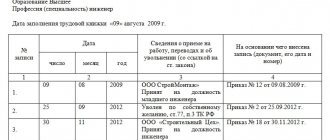Purchasing legal addresses as a common practice
Russia is a country of “registered” people.
Citizens must register their place of residence. At the time of their “birth”, enterprises must indicate in their documents the legal address where the company’s office is located, the manager’s workplace, where accounting documents are stored. This requirement of the Federal Law “On State Registration of Legal Entities and Individual Entrepreneurs” No. 129-FZ has been actively ignored by the majority of entrepreneurs until today. During state registration, a legal address was often purchased. A lease agreement was drawn up between the owner of the non-residential premises and a legal entity. At the same time, the real office could be located in another room or it could not exist at all.
It's no secret that over the past 20 years, hundreds of thousands of companies have been registered in the Russian Federation - shells that have no property, that do not produce anything, do not trade goods, and do not conduct business activities at all. Their role is to be used in illegal cash withdrawals, tax evasion, and fraudulent schemes. These enterprises were registered under dummies and using purchased legal addresses, which housed hundreds of such shell companies.
How can I check
When purchasing a legal address, you can check its status not only with the Federal Tax Service. This can be done by a private or legal entity without outside help. If you wish, you can use free resources, although paid options also exist.
One way is to visit sites that display lists of mass legal registrations. persons Just be careful when choosing a source, as it often turns out that it provides outdated, not updated information. Fresh special selections of registration places are needed for a complete picture of the situation in the selected city.
To obtain absolutely reliable information, you should visit the official website of the Federal Tax Service. It contains complete information relating to all regions of the Russian Federation, all addresses included in the register during state registration of organizations are indicated. This is done by people in whose interests it is to issue complete and up-to-date lists of mass places of registration of organizations.
Not always for one-night stands
To be fair, it should be noted that at the same addresses there were also completely normal companies conducting legal business activities and paying taxes.
I dare to suggest that the offices of more than 90% of companies in Moscow and large industrial cities until recently were not located at the stated legal addresses. Why, why do they need this? The answer is quite simple. At the time of registration, the business is small, 1-2 people work in the office. In a year there are 10 employees, in another two - 50. The company is forced to change its office; it is looking for a convenient option within the entire city, and not in the territory assigned to the Federal Tax Service. If you follow the requirements of the law, every time you change office you need to change your legal address, and this costs money and takes time.
Since 2003, Article 14.25 has been added to the Code of Administrative Offenses of the Russian Federation, according to which the tax service has the right to fine the head of a company for submitting false information to the Unified State Register of Legal Entities, but the tax authorities did not have enough strength (or perhaps political will) to force all enterprises to bring your documents in accordance with the law.
And since regulatory authorities did not pay attention to the discrepancy between addresses, entrepreneurs did not want to spend their resources on solving this problem.
Does this blacklist really exist?
The tax authorities actually have a confidential database provided by a secret resource. It includes all taxpayers who, for one reason or another, are recognized as unreliable.
Companies do not have the opportunity to study the content of this service. But sometimes relevant information about certain companies appears on the Internet. Here you will learn how the new function of the Federal Tax Service website “Contact the Federal Tax Service of Russia” works.
The concept of IR “Risks”
The information resource, called “Risks,” is represented by the internal database of the tax service of the Russian Federation. The information contained in this service is confidential and cannot be accessed by taxpayers.
Features of the creation and use of this resource include:
- the main purpose of its creation is the automatic collection of information about various companies that are taxpayers;
- this service accumulates, stores and processes numerous data about various companies that are unreliable, for example, do not pay taxes on time or violate legal requirements in the process of functioning;
- Only organizations that can hide their income or engage in any illegal activities are included in this list;
- the resource was created on the basis of the Order of the Federal Tax Service No. MMV-8-2/42dsp@;
- it is intended exclusively for official use, therefore only employees of the Federal Tax Service have access to it;
- The Regulations to the Order contain information on how to use proprietary information, and the dissemination of confidential information is not permitted under this document.
In this article you will learn by what rules an enterprise develops regulations on trade secrets and confidential information.
Citizens or companies that are standard taxpayers will not be able to access the Risks resource in any way. How it works and what can be done in the personal account of a taxpayer of the Federal Tax Service - see here:
Banks are the new tax police
In 2015, banks were forced to take over some tax control functions.
“Regulations on identification of clients by credit institutions…. "(approved by the Bank of Russia on October 15, 2015 N 499-P) obligated them, when opening an account, to check the accuracy of the information provided, including the location of the management bodies of legal entities. To do this, the bank's security service goes to the company's office to talk with the manager. At the same time, until 2022, the bank did not insist that the office address coincide with the legal address, and two addresses were indicated in the legal entity’s application form: real and legal.
How the powers of tax officials have changed when checking citizens
The tax service acquired most of its powers back in 2016. Thus, banks now have an obligation to report to the tax authorities about the opening and closing of accounts with ordinary citizens. Moreover, such a requirement was in the tax code back in 2014, but in a slightly different wording.
The Tax Service has had access to information about citizens' accounts for more than six years. A significant difference between this year’s innovations is that the tax inspectorate could obtain data on citizens’ accounts only during audits. Now banks are required to provide this information without verification.
Bankiros.ru
However, this changes little. And without this amendment, banks could not refuse the tax inspectorate to provide information. Financial institutions are required to inform the Federal Tax Service on the basis of Article 86 of the Tax Code of the Russian Federation:
Deposit "Maximum Income" Moscow Credit Bank, Person. No. 1978
up to 21%
per annum
from 1 thousand
up to 730 days
Make a contribution
- on opening and closing accounts and deposits since 2016;
- on changing the details of citizens' accounts from July 1, 2014;
- on granting the right to a company or individual entrepreneur to use corporate electronic means of payment from September 1, 2016;
- on granting the right to a citizen to use personalized electronic means of payment from September 1, 2016;
- on account balances and statements of accounts opened in precious metals from June 1, 2022;
- about accounts linked to electronic wallets from April 1, 2020.
Bankiros.ru
Legislation is changing
However, in the spring of 2022, life for entrepreneurs became more difficult.
The level of tax administration has made it possible to begin a real fight against tax evasion by enterprises, and the requirement for legal entities to have a “registration” is one of the important elements of this fight.
For this purpose, a regulatory framework was created: Federal Law dated March 30, 2015 N 67-FZ amended Art. 9 of Law No. 129-FZ, issued an order of the Federal Tax Service of Russia dated 02/11/2016 N ММВ-7-14/ [email protected] , defining the conditions and methods of carrying out measures to verify the accuracy of information entered in the Unified State Register of Legal Entities.
The tax burden
If a taxpayer has a tax burden below its average level in a particular industry, then such a person may be included in the list of those being audited.
Indicators of the tax burden starting from 2006 for the main types of economic activity are given in Appendix No. 3 to the order of the Federal Tax Service of Russia dated May 30, 2007 No. MM-3-06/333. This document stipulates that the amount of the tax burden is calculated as the ratio of the amount of taxes paid and the turnover (revenue) of the organization. The payment amount is taken according to information from the tax authorities, and revenue - according to Rosstat.
The level of tax burden for most types of economic activity in 2010 decreased compared to the previous year. Thus, in the industry associated with the extraction of fuel and energy minerals, the load decreased from 50.5 to 33.2 percent, in metallurgical production and the production of finished metal products - from 7.4 to 2.6, etc. But there are industries in which the workload increased in 2010, for example, publishing and printing activities, construction, activities for organizing recreation and entertainment, culture and sports.
Please note: there are no correction factors when comparing the actual level of tax burden with the statistical average. The same cannot be said about another criterion for assessing a taxpayer’s commercial activities.
Notifications from the tax office
Over the past six months, almost all Moscow enterprises that do not rent an office at a legal address have received notification letters from the Federal Tax Service No. 46 (as our clients say, “chain letters”) about the need to provide reliable information.
Letters are sent to the home addresses of all company participants and their directors. Referring to clause 4.2 of Art. 9, paragraph 6 of Art. 11 of Law 129-FZ, in case of failure to comply with this requirement, the tax authority threatens the company with making an entry in the Unified State Register of Legal Entities about the unreliability of information about the legal entity.
Consequences of opening a company that is blacklisted by the Federal Tax Service
When purchasing a legal address (renting also applies here), you should be careful and do this only from reliable organizations. One of the reliable organizations www.prime-law.ru. They check the space provided to clients against the databases, eliminate risks and have transparent intentions, orderly documentation. If you act recklessly in this matter, your business is exposed to the following threats:
- Increased control of the Federal Tax Service. Representatives of the tax service will come to the site and carry out unscheduled inspections, which is not very pleasant.
- Rejection of a request to open a company. This means lost time and money invested in the beginning (state fees, preparation of documentation, etc.).
- Difficulties opening accounts, resulting in failed transactions.
These are the main negative consequences; in individual cases there may be more. It is important to foresee and prevent these moments by cooperating only with trusted organizations. Sometimes it turns out to be more expensive, but much cheaper than potential losses as a result of trusting scammers.
Reasons for excluding BVI
South Korea has been on the Federal Tax Service’s blacklist for a year, while the British Virgin Islands have been on the blacklist since its first publication. The reason for their exclusion was the increase in business transparency. The BVI authorities have taken a number of measures to achieve this, the key of which is the launch of a centralized register of business owners in July 2017.
This register, the Beneficial Ownership Secure Search System (BOSS), contains the data of all business structures registered on the islands. These include the name, date of birth and nationality of the owner.
The system itself is not public, but BVI authorities have automatic access to it. It will also provide information upon Russia’s requests.
#reference According to Russian law, the beneficial owner is an individual who owns or controls more than 25% of the company's capital.
The creation of government databases of beneficiaries is required by the 4th EU Anti-Money Laundering Directive (AMLD4) of 2015, but BVI is the first offshore company to implement it. Such databases must contain information about the real owner of the company, even if he controls it through a chain of offshore companies. This is the difference between beneficiary databases and registers such as SPARK or the Unified State Register of Legal Entities, where nominal owners are disclosed.
How to check a legal entity address on the website of the Federal Tax Service (FTS)
This site contains thousands of places for mass registration of legal entities. persons, they are always relevant and regularly updated. That is, this is first-hand information. To check, you should:
- Using any convenient browser, type the name of the Federal Tax Service in a search engine, and from the list of results go to the official website.
- Find a special online service there.
- Use drop-down items on the page of this section.
- There you will need to provide basic information about the region, city, street, and building number.
- After the user confirms the information at the bottom of the window, the system displays data regarding the legal address. The number of companies registered under it is displayed (there is no listing of names and other details, only a number relating to the specific location of the building).
This is not a complicated procedure, but it is mandatory, especially on the eve of signing a lease agreement and concluding other transactions. This will give an accurate understanding of the real figures indicating the number of companies registered locally, and not the data that was announced by the tenant or owner. That is, such a simple but important check will allow you to avoid fraud or other troubles in the future.
The Federal Tax Service makes excuses
The director of a company that was on this secret list contacted the Federal Tax Service. Attached to the letter was a printout of a screenshot of the “Risks” IR page.
“Nothing terrible happened,” this is how the Federal Tax Service responded to the taxpayer’s appeal, issuing letter No. ED-4-2 / [email protected] dated 09/07/2018.
According to the rules for the formation of the named resource, the facts of inclusion of a taxpayer in the “Risks” information resource are not unambiguous indicators of the organization’s unreliability.
The information resource “Risks” contains reference information for decision-making by tax officials on the advisability of carrying out tax control measures in relation to specific legal entities.
The Federal Tax Service concludes that the actions of the tax authorities to include the taxpayer in the “Risks” information resource do not violate the legitimate interests of the organization in the field of business activities and do not create obstacles to the implementation of business activities.
In addition, the Federal Tax Service emphasized that providing information contained in the information resources of the Federal Tax Service of Russia is impossible.
What about the screenshot? The Federal Tax Service noted that this is a copy of the “Risks” IR page, which is a resource for the official use of tax authorities, to which the applicant does not have the right to access. It is not endowed with legal status and does not entail legal consequences.






